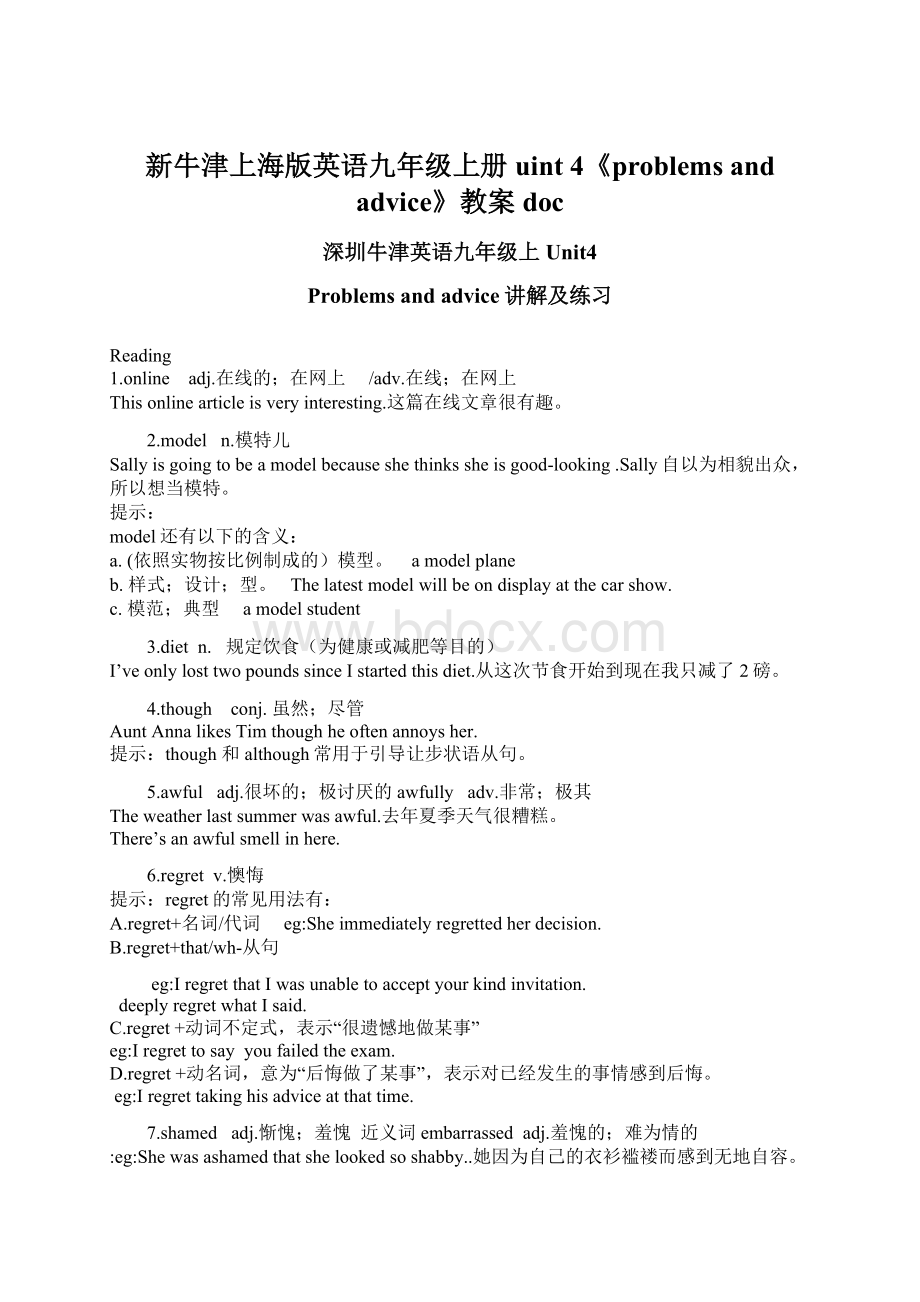新牛津上海版英语九年级上册uint 4《problems and advice》教案doc.docx
《新牛津上海版英语九年级上册uint 4《problems and advice》教案doc.docx》由会员分享,可在线阅读,更多相关《新牛津上海版英语九年级上册uint 4《problems and advice》教案doc.docx(8页珍藏版)》请在冰豆网上搜索。

新牛津上海版英语九年级上册uint4《problemsandadvice》教案doc
深圳牛津英语九年级上Unit4
Problemsandadvice讲解及练习
Reading
1.online adj.在线的;在网上 /adv.在线;在网上
Thisonlinearticleisveryinteresting.这篇在线文章很有趣。
2.model n.模特儿
Sallyisgoingtobeamodelbecauseshethinkssheisgood-looking.Sally自以为相貌出众,所以想当模特。
提示:
model还有以下的含义:
a.(依照实物按比例制成的)模型。
amodelplane
b.样式;设计;型。
Thelatestmodelwillbeondisplayatthecarshow.
c.模范;典型 amodelstudent
3.diet n. 规定饮食(为健康或减肥等目的)
I’veonlylosttwopoundssinceIstartedthisdiet.从这次节食开始到现在我只减了2磅。
4.though conj.虽然;尽管
AuntAnnalikesTimthoughheoftenannoysher.
提示:
though和although常用于引导让步状语从句。
5.awful adj.很坏的;极讨厌的awfully adv.非常;极其
Theweatherlastsummerwasawful.去年夏季天气很糟糕。
There’sanawfulsmellinhere.
6.regret v.懊悔
提示:
regret的常见用法有:
A.regret+名词/代词 eg:
Sheimmediatelyregrettedherdecision.
B.regret+that/wh-从句
eg:
IregretthatIwasunabletoacceptyourkindinvitation.
deeplyregretwhatIsaid.
C.regret+动词不定式,表示“很遗憾地做某事”
eg:
Iregrettosay youfailedtheexam.
D.regret+动名词,意为“后悔做了某事”,表示对已经发生的事情感到后悔。
eg:
Iregrettakinghisadviceatthattime.
7.shamed adj.惭愧;羞愧 近义词embarrassed adj.羞愧的;难为情的
:
eg:
Shewasashamedthatshelookedsoshabby..她因为自己的衣衫褴褛而感到无地自容。
8.situation n.情况;状况
;eg:
Thesituationwasunderthecontrol.局面得到了控制。
She’sinaverydifficultsituation.
9.braces n.(pl.)儿童牙箍
Todaymoreandmorechildrenwearsbraces.
10.hate v.憎恶;厌恶 近义词:
dislike
提示:
hate的常见用法有:
A.hate+名词/代词/动名词
.eg:
Ihatespinach.我讨厌菠菜。
Shehatesmakingmistakes.
B.hate+不定式
.eg:
Hehatedtobeawayfromhisfamily.
11.advantage n.优势 反义词disadvantage n.缺点;劣势
eg:
Inhiseyes,theschool’sonlyadvantagewasitslocation.
12.embarrassedadj.窘迫的;尴尬的embarrassmentn.窘迫;尴尬
embarrass v. 使窘迫;使尴尬
embarrassing adj.令人害羞的;令人尴尬的
eg:
IthoughtaboutshoutingbutIwasembarrassed.
13.suggest v. 建议;提议 suggestion n.建议
提示:
suggest表示“建议;提议”时,其主要用法有:
A.接名词作宾语。
.eg:
Wesuggestedavisittothemuseumthenextday.
B.接动名词作宾语。
.eg:
Isuggestedputtingoffthesportsmeeting.
C.接that引导的宾语从句,tha从句中用should+动词原形,that,should可省略。
.eg:
Wesuggested(that)he(should)g0andapologizetohisteacher.
此外,suggest还可意为“暗示;表明”
Thesimplehousesuggestedasmallincome.
其后亦可接宾语从句,从句用陈述语气。
.eg:
Theexpressiononhisfacesuggestedthathewasveryangry.
14.mad adj.很生气;气愤
madly adv.生气地;愤怒地 madness n.疯狂;愤怒
.eg:
Shewasafraidofgoingmad.她担心自己会疯掉。
15.mess n.杂乱;不整洁
inamess一团糟;杂乱无章 messyadj.杂乱的
.eg:
Oh,mgoodness!
Yourroomisreallyamess!
16.annoying adj.使恼怒的;使生气的
annoy v.使生气;使不耐烦 annoyed adj.生气的;恼怒的
eg:
Hisattitudeisannoying.他的态度令人讨厌。
Theannoyingthingabouttheplanisthatit’sconfusing.
这项计划让人讨厌的地方是它让人一头雾水。
B.
1.I’’mworriedaboutmyfriendJolin.
beworriedabout 为....担心;为....担忧 =worryabout
Shewasworriedabouthissafetyandwentalongwithhim.
她十分担心他的安全,于是与他一同前往。
不必为John担心,他很快就会回来的。
___________________________________________
2.She’salwaysonadiet.
Onadiet节食
.eg:
Helenhasbeenonadietfortwoweeks.
我曾经节食过,但后来放弃了。
________________________________________________
3.She’sgettingtoothin,butwheneverItalktoheraboutthis,shegetsangry.
whenever在本句中用以引导时间状语从句,表示“每当一 就”,其用法与when相似,但语气更强。
Theroofleakswheneveritrains.这屋顶一下雨就漏。
我一跟他提踢足球的事,他就说忙。
_____________________________________________
Talktosb.aboutsth.和某人说某事,跟某人提及某事,与mentionsth.tosb.意思相近。
ody
Didyou_____ _____him_______therecentcase?
你跟他提及最近的案子了吗?
4.Wesawaladylying inthestreet.
Seesomebodydoingsomething看到某人正在做某事,表示看到了事情的片段。
而seesomebodydosomething意为看到某人做某事,往往强调看到了事件的全过程。
Isawhercleantheclassroom.强调做过某事
Isawhercleaningtheclassroom.强调正在做某事
Inthestreet在马路上;在街道上
正在马路上走,突然有人叫我。
_______________________________________________
5.Myfriendsmadejokesaboutherandlaughed.我的朋友们取笑她,还哈哈大笑。
Makejokesaboutsomebody意为“取笑某人;开某人的玩笑”,与“laughatsomebody”意思相近. .eg:
TheysanganddancedaroundthehorseandmadejokesaboutthestupidGreeks.
6.ThoughIwantedtohelpher,myfriendstoldmenotto.
尽管我想帮她,但我的朋友们却叫我不要那么做。
本句中由于wantedto后出现了helpher,toldmenotto后便省略了相同的内容。
tellsomebodynottodosomething是tellsomebodytodosomething的否定形式。
Itoldhimnottogo,buthewouldnotlisten.
7.Itwasawfulofthemtolaughather,andIregretnotsayinganything.
他们这样取笑她是很可耻的行为,而我却为自己什么话都没说而感到后悔。
在“Itis+形容词+不定式”的结构中,我们常常可以在形容词后加上of/for的短语。
现将两者的区别简述如下:
A.ofsomebody的句型一般用来表示人物性格品德的形容词,如kind.nice,clever,foolish等。
.eg:
It’sveryniceofyoutohelpme.
B.forsomebody的句型中,形容词一般表示对做这件事情的评价。
如easy,hard,difficult,interesting,impossible等。
.eg:
It’sveryhardforhimtolearntwolanguages.
regretdoingsomething 意为“后悔做了某事”,强调为已经做过的事情感到后悔;而regrettodosomething则表示“很遗憾地做某事”,强调事情还未做。
.eg:
HeregretsnotlearningEnglishwellbefore.
Iregrettotellyouthatyoudidn’tpsstheexamination.
8.Ifeelashamedofmyself.我对自己感到羞愧。
.feelashamedof意为“对......感到羞愧”
.eg:
Hefeltashamedofhismistakes.
9.WhatshouldIdointhissituation?
遇到这样的情形我该怎么办?
inthissituation在这种情况下
HowcanIkeephappywhenIaminthissituation?
10,I’vejuststartedwearingbraces,butIhatethem.我刚开始戴牙箍,但我很讨厌这东西。
Startdoingsomething=starttodosomething开始做某事;着手做某事
.eg:
Assoonastheysitdownbesideaboy,theystartedmaking/tomakefunofhim.他们刚在一男孩子身边坐下来,就开始拿他开玩笑。
但在如下情况下要注意:
A.start用于进行时时,后接不定式todo .eg:
Iwasstartingtogetangry.我开始生气起来。
B.后接know,understand,realize这类动词时常用不定式。
.eg:
Istartedtounderstandthetruth.我开始明白了真相。
11.Idon’tseeanyadvantageinwearingthem.我看不到戴它们有任何好处。
表示“某一方面的好处”时,advantage后需跟介词in.
.eg:
Isthereanyadvantageingettingthereearly?
早到那里是否有好处?
12.Myfriendsalllaughatmeandsaybadthingsaboutme.我的朋友们嘲笑我,还说我的坏话。
aybadthingsaboutsomebody意为“说某人坏话”
.eg:
Don’tsaybadthingsabouthimwhenheisnotaround.
13.
Ihavetosharearoomwithmyseven-year-oldsister,andshe’sdrivingmemad.我不得不和我七岁的妹妹合住一个房间,而她真让我受不了。
sharearoomwithsomebody与某人分享某物 sharearoomwith与 合住一个房间
.eg:
Ioftensharemylunchwithmybestfriend.
seven-year-old是一个复合形容词,意为“七岁大的”,用作定语,修饰一词。
复合形容词是指由两个或两个以上的单词构成的形容词。
复合形容词一般作定语,往往由连字符连接,复合形容词中若包含有名词,则该名词一般有单数。
.eg:
Thisisa30-metre-wideriver.
Ihaveathree-year-oldbrother.
drivesomebodymad让某人受不了
.eg:
WheneverIchatwithhim,healwaysdrivesmemad.
每次跟他聊天,他都会让我发疯。
14.ShehasahabitofplayingthepianowhenIamstudying,andshealwaystakesmythingswithouttellme.我一学习她就开始弹钢琴,而且总是不告诉我一声就拿我的东西。
haveahabitofdoingsomething有。
。
。
的习惯
.eg:
Somepeoplehaveahabitofinterruptingothersinaconversation.有些人有在谈话中打断别人的习惯。
15.Itrytokeepmyroomtidy,butshealwaysmakesamess.我尽力保持房间的整洁,她却总是弄得一团糟。
Trytodosomething尽力做某事 trydoingsomething尝试做某事 比较:
Shetriestoworkouttheproblem.她尽力做出这道题。
Shetriedworkingouttheproblem.她试着做出这道题。
Makeamess弄得一团糟
.eg:
Ifyoumakeamess,youwillcleanitupyourself.如果你弄乱了,就得自己收拾。
比较none,noone/nobody,nothing
noone/nobody常用来指人,作主语时谓语动词要用单数形式。
Nothing常用来指物,作主语时谓语动词也要用单数形式。
None既可指人也可指物,,作主语时,如果和of连用指不可数名词时,谓语动词要用单数形式;指可数名词时,谓语动词用单,复数形式均可。
Noonelikesapersonwithbadmanners.
Nothingisdifficultintheworldifyouputyourheartintoit.
NoneoftheworkisdonebyBob.
Noneofthemhas/haveseenmebefore.
注意:
A.none与of连用表示范围,而noone/nobody和nothing则不可以。
B.none用来回答Howmany/much.....?
的特殊疑问句,而noone//nobody和nothing则分别用来回答who....?
和What.....?
的特殊疑问句
.eg:
1.Howmanybirdsarethereinthetree?
-------None
2.Whoisintheclassroom?
------Noone./Nobody..
3.Whatisinthebox?
------Nothing.
C.none可以用来回答“any+名词”构成的一般疑问句,而nobody和nothing则分别用来回答nobody和nothing构成的特殊疑问句
Isthereanybreadleft?
---No,noneatall.
Isthereanythinginthesky?
-----No,nothing.
1.shoutat.....对某人大叫
2.bepoliteto对....无礼
3.Noneofyourbusiness.不关你的事
4.hearfrom收到......的来信
5.keepdoingsth.不停地做某事
6.givesth.back归还某物
7.Stay/goonadiet
8.Getsb.todosth.
语法部分:
句子的成分
1、主语:
是一句的主体,是全句诉说的对象,常用名词、数词或代词担任(是全句谈论的中心话题)。
例:
(1)Studentssyudy.(名词)
(2)Wearefridends.(代词)
(3)Togotogooduniversityishisfirstgoal.(不定式)
(4)Doingmorningexerciseisgoodforyourhealth.(动名词)
(5)Whathehassaidistrue.
2、谓语:
是对主语加以陈述,表示主语的行为或状态,常用动词或动词词组担任,放在主语的后面(主语做什么了、怎么了)。
例:
(1)Studentsstudy.(实意动词)
(2)Wearefriends.(be动词)
(3)WeloveChina.
(4)Wehavefinishedreadingthisbook.
(5)HecanspeakEnglish.(复合谓语)
(6)Sheseemstired.
(7)Isawtheflagonthetopofthehill.
(8)Helookedaftertwoorphans.
3、宾语:
表示行为的对象,常由名词或代词担任,放在及物动词或代词之后(动作的对象,目标;位于及物动词之后)。
宾语分为间接宾语和直接宾语。
直接宾语指物,间接宾语指人。
例:
(a)Hegavemesomebooks.
间接宾语直接宾语
(b)Pleasepassmethebook.
(c)Heboughtmesomeflowers.
注:
位于介词之后的成分也称之为宾语。
4、宾语补足语:
是对宾语进行补充说明,宾语和宾语补足语一起构成复合宾语。
例:
(1)Ifoundthebookinteresting.
(2)Doyousmellsomethingburning?
(3)Hemadehimselfknowntothem.
主动语态变成被动语态后,宾语补足语变成主补。
例:
(1)Ilastsawhimplayingneartheriver.→Hewaslastseenplayingneartheriver.
(2)Theteachercaughtthestudentcheatingintheexam.
→Thestudentwascaughtcheatingintheexam.
(3)Wemadehimmonitor.→Hewasmademonitor.
(4)Hepushedthedooropen.→Thedoorwaspushedopen.
5、定语:
是用来说明或者限制名词的成分,常用形容词或者相当于形容词的短语或从句担任(是用来说明名词或代词性质特点的词)。
形容词放在名词前,相当于形容词的短语或从句放在名词之后。
例:
(1)Thisisaredsun.
(2)Theblackbikeismine.
(3)Heisatallboy.
6、状语:
是用来说明动词,形容词,副词、介词短语或整个句子的成分,常由副词担任。
修饰动词的可以放在动词之前,也可以放在动词之后;修饰形容词或副词的放在它们之前。
例:
(1)Thestudentsstudyhard.
(2)Ioftenwritetohim.
(3)Thebagistooheavy.
(4)Iwillbebackinawhile.
7、表语:
系动词后的部分就是表语,表语是用来说明主语的性质或状态。
一般由名词或者形容词担任。
常见的系动词有:
be(am,is,are,were,was),aapear,look,seem
feel,smell,taste,sound,keep,turn,become,get,grow,come,goetc.系动词不用于被动语态。
例:
(1)Thistableislong.
(2)Theappletastessweet.
(3)Thewarwaso